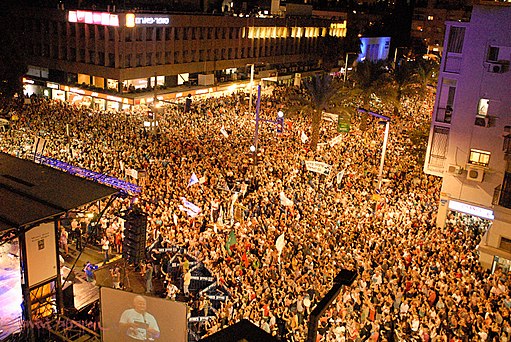A survey by the Central Bureau of Statistics (CBS) published last week, found that for the first time in 30 years there has been an increase in the number of unionized workers in the Israeli workforce. According to the survey, 200,000 new workers have unionized since the beginning of the mass wave of labor organizing in 2008; the percentage of unionized workers rose by 2% – from 25% in 2012 (when the last survey on the subject was conducted) – to 27% today. Considering the rates of retirement and the transition of jobs abroad, the increase in the percentage of unionized workers since 2012 is 5%. The rise of the organized labor is a unique phenomenon to Israel, whereas in the rest of the Western world the trend is reversed.
Between 1995 and 2007, the percentage of unionized workers in Israel dropped as a result of privatization processes, the transition of workers to contracting employment, a change in the structure of the Histadrut (the General Federation of Labour in Israel) and neoliberal government policies. The current wave of unionization, which the CBS survey examines extensively, started in 2008, with the establishment of Koah LaOvdim (Power to the Workers – an Israeli labor union organization) and continued in 2010, when the Histadrut established a new department for unionizing new workers. These processes, along with the 2011 Israeli social justice protests and a precedent-setting ruling from 2012, that established that an employer is forbidden to intervene in the unionization of his employees, resulted in hundreds of new unions joining the workers’ organizations. The new unionized workers come from all sectors of Israeli society and economy: kindergarten teachers, workers of insurance and high-tech companies, security guards, bus drivers, teachers, supportive housing workers and bank employees.

The survey shows an increase in public support for organized labor. 69% of the workers who are union members say the labor organizations representing them protect employees from arbitrary behaviour of the employers, prevent dismissal and provides legal protection. More than half (56%) of unionized workers are satisfied with the activity of their union. 89% of the public support the workers’ right to unionize and 64% believe that a workplace with a union will have better job security. These findings are consistent with the findings of a survey conducted by “Midgam” for the 2017 May Day conference of the Social Economic Academy, according to which 75% of the public believe that unions reduce social inequality, and 89% view the current wave of unionization as a positive phenomenon.
The increase in the percentage of unionized workers has a positive effect on the entire Israeli society, including non-unionized sectors and workers. The minimum wage in Israel has risen in recent years after years of erosion, and the Gini index, which measures inequality in income distribution, has decreased for the first time in many years. In addition, following an agreement between the Histadrut and the State, over the last two years thousands of workers that were previously employed through contract agencies have been hired directly by the state.
Rami Hod, the executive director of the Berl Katznelson Educational Center and the Social Economic Academy, referred to the findings of the survey: “The Israeli society, which was built on the foundations of organized labor, is returning to its roots, and shows renewed confidence in the unions. The unions give back: beyond the obvious concern to their own members, they work to help all workers in the Israeli economy. We still have a lot of work to do, but it is obvious that this massive current wave of unionization, with 200,000 new unionized workers in the last decade, is the most important and profound social change taking place in Israel. ”

